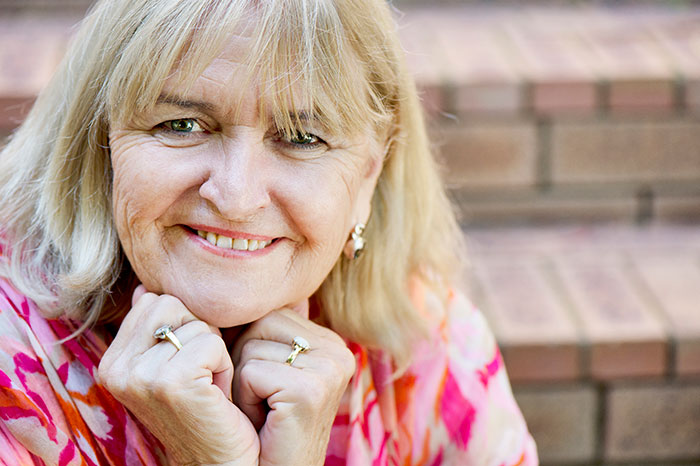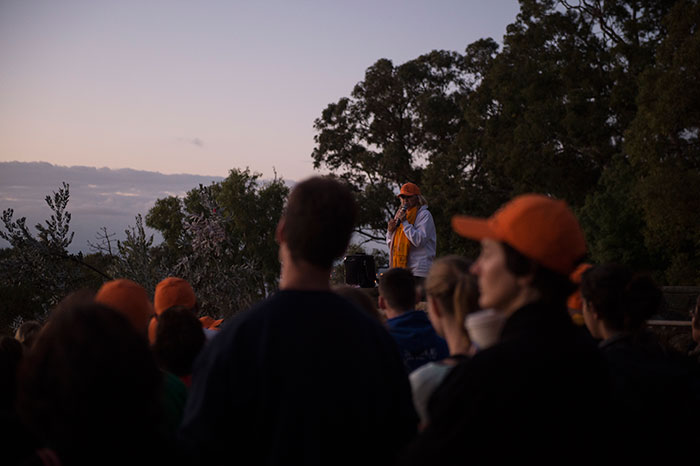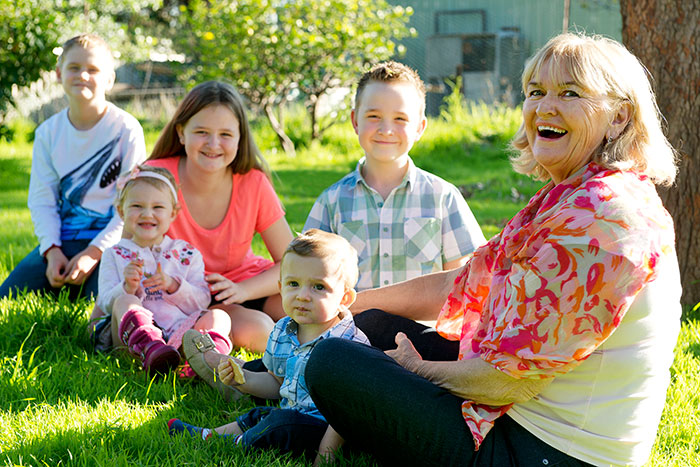Ros Worthington has turned disadvantage into a formidable force for good.
If you wanted to, you could write the life of Ros Worthington as a tragedy, dictated by a string of traumatic events. After all, at age three she was abducted with her brother from their Collie home, under instruction from their paternal grandmother, and wound up in an orphanage. She was placed in foster care, where she was sexually abused regularly between the ages of four and twelve. She suffered from a potentially lethal breast disease. And her second husband, the true love of her life, died by his own hand.
But she'd rather you didn't tell her story that way. Ros is resolute in her stance that she's a lucky one. For her, wallowing isn't an option. "Don't use that you've had a shocking childhood as an excuse because, mate, that doesn't wash with me," she says. "There's always people in the community who are worse off. I am so blessed. I receive karma every day of my life."
Indeed, the 62-year-old charity powerhouse, Order of Australia medallist and honorary doctorate recipient has made it her life's mission to transform pain into power – and the face of the WA charity scene along with it.
Her mellifluous speech – her voice could have earned her a living recording children's audio books – is peppered with colloquialisms and the occasional curse word. "Being authentic is my main priority," she says. It's why she's painstakingly careful about what she puts her name to, each cause on her philanthropic CV hinting at who she is and what she's endured.

Ros Worthington. Photography by Jody D'Arcy.
It started in 1986, when she established the Make-A-Wish Foundation in Western Australia. By day, she would grant sick children's wishes, holding in her tears until she got back to her car. At night, she would kiss her sons as she tucked them
into bed, and cry, grateful for her good fortune. "What wish did you grant today?" they would ask.
A battle with chronic breast disease, which started when she was 16 and culminated in a mastectomy at 34, inspired Ros to change philanthropic gears. She formed a specialised mastectomy boutique in 1976 while living in New Zealand with her young family, where she would spend hours talking to women as she fit their prosthetics, learning their stories. She started to notice a trend – women who had "fallen through the gaps" of the government system and were struggling financially.
So, with barely a cent to her name but a big vision, she founded Breast Cancer Care WA (formerly the Breast Cancer Foundation of Western Australia) in the back of her boutique in 2000. She wanted to see people who had been diagnosed with breast cancer – like those in her boutique who couldn't afford prostheses – given the funding and support they needed.

Addressing walkers at the Out of the Shadows and Into the Light event. Photography by Shannon Kate Photography.
The five years that followed were "incredibly challenging". Funding was scarce, support faltering. And, tragically, Ros's husband, who she describes as her "soul mate" took his own life in 2002. "My grief was…" She falters. "It was very difficult. It was a terrible grief and not only for me but for the whole family. The ripple effect when someone suicides is quite horrendous for the family left behind."
But miraculously, Ros displayed a rare gift that has now become something of a trademark – her ability to "turn pain into power". She worked tenaciously on Breast Cancer WA, picking up the phone daily, and enlisting an incredible support team – particularly the directors, who were predominantly breast cancer survivors. Slowly, the organisation began to flourish, providing free services other charities weren't offering. "We would pay for a lady to fill her fridge with food, or a week's rent, or assist women with support for treatment," she says. "We'll hang out your washing. That's what makes us so unique." In her time with the organisation, Ros also worked extensively with Indigenous women, travelling to remote communities to teach them about breast cancer. "They called me a blackfella in a white skin, and that was probably the biggest compliment that I could have ever had," she says.
Now, despite never having had any government funding, the organisation is the largest service provider outside hospitals for WA women and their families facing breast cancer. And next year, it's set to get even bigger, with the launch of a major campaign in collaboration with the McGrath Foundation. Ros's friend, philanthropist Nicola Forrest, has pledged her support for the cause; the two women are united in their belief that collaboration is needed between charities.

At the Out of the Shadows and Into the Light event with health campaigner Alison Glenister–Bielby. Photography by Shannon Kate Photography.
"Ten to 15 years ago, if you approached another charity to collaborate it would be
a polite, 'No, thank you'," says Ros. "With well over 800 charities registered in WA it gets really tough for many of them. I say let's collaborate and work together to making a difference in our community."
During those dark years following Ross's death, Ros also devoted part of her life to working with Lifeline WA to try to de-stigmatise suicide and depression. She started Out of the Shadows and Into the Light, a dawn walk in Kings Park on World Suicide Prevention Day for people who have lost loved ones to suicide. "While I've stepped away from working with Lifeline now, I still meet someone every day who will talk to me about depression, or who's lost someone to suicide," she says. "It's a little bit easier to deal with that sorrow and grief when you're doing goodness."
As Ros tells me about The Dementia Foundation, the latest organisation she's aligned with, her excitement is palpable. An ambassador for the group, she is in awe of the work it does, specifically the Spark of Life philosophy the charity uses to deal with dementia patients, promoting values like feeling useful and having the power to choose.
"You can't cure dementia, but you can make someone's life more dignified and lift their spirit. When someone gets dementia and they're in a nursing home, the light goes from their eyes, their spirit dies. But the Spark of Life brings back their spirit and lifts them," she says. "They had one gentleman who hadn't spoken in two-and-a-half years, and after an hour with them he was reciting stories about being in the trenches as a digger. You've got to see it to believe it!"
She also runs the Love Angel Project, an initiative to foster philanthropy in children from a young age. "Charity begins at home with children. It's not just about helping orphanages in Bali and Sri Lanka and Afghanistan – which are the three we help – it's also about teaching children to pay it forward with kindness. The children are our future and my greatest love is to educate them that it is cool to be kind. We call them our mini philanthropists."

Ros with her grandchildren. Photography by Jody D'Arcy.
It's an organisation particularly close to her heart because she can share it with her grandchildren. "My grandchildren are my world. Jasmin is twelve, she was born on the day I buried my husband, my soul mate," she says softly. "I remember saying my goodbyes to him and knowing that Jasmin was waiting. Rhylee, who's now thirteen, was nine months old, so to be able to hold my little granddaughter, Ross's granddaughter, started the healing process."
Ros has been approached several times in the past ten years about writing a book. She laughs, "I've got a book in me so big. Someone said to me, 'You've even got a movie in you!'" For now, it seems she's reached her happy ending. She lives in the Perth Hills with her son and daughter-in-law and three grandchildren, pottering around the vegie garden and tending to her chickens. "I just love being
a hands-on granny," she enthuses. "It's the best move I've ever made. I am so contented, and I can honestly say I have true happiness."
But don't assume her numerous accolades have anything to do with that. "It's wonderful to be acknowledged, but it's not why I do it. However I will say they've opened the doors to me to continue my philanthropic endeavours," she says, adding with a wry smile, "which I'll do till the day I fall off my perch."